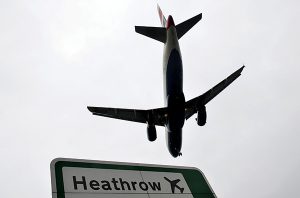Bloomberg
Less than a decade ago, London’s Heathrow was the undisputed hub airport for Europe, with thousands of daily passengers and an ambitious expansion plan that included a brand new runway. Terminal 5 was still a novelty — the UK’s largest free-standing building hosted a string of glitzy shops and restaurants, including one founded by celebrity chef Gordon Ramsay. The airport was associated with aspiration, growth and an outward-looking Britain.
How things change. Today, Heathrow is locked in yet another dispute with airlines after insisting they halt ticket sales during the lucrative school holiday season, a move that could cost as much as $500 million in lost revenue. The airport has been struggling to manage a post-pandemic rush in holidaymakers, with long queues of frustrated fliers
becoming a common scene.
Any prospect of a third runway remains years away, as critics ask whether Heathrow needs more space if it cannot even cope with its current capacity, regardless of environmental concerns. With Britain’s chronic labour shortage at the heart of the travel chaos, Heathrow’s travails have become emblematic of a nation beset by economic stagnation, political upheaval and an increasingly uncertain place in the world.
Heathrow is not alone, of course. It has been a torrid summer for air travel across Europe. London’s Gatwick, Amsterdam’s Schiphol and Frankfurt are among a number of airports limiting capacity. Nonetheless, the UK has been harder hit than its counterparts on the Continent, given its extremely low number of job-seekers and a limited supply of European labour post-Brexit.
The airport’s relationship with carriers was already strained after it tried to increase fees by as much as 95% compared with pre-Covid levels, to compensate for the hit from the pandemic. The plan led to Willie Walsh, the former head of British Airways, accusing the airport’s bosses of having “zero commercial nous.†In June, the UK’s Civil Aviation Authority limited fees to an average maximum price of £26.31 ($31.17) per passenger in 2026, down from £30.19 today — a victory for the airlines and a bloody nose for Heathrow.
The tensions are heightened by the effect of Covid, which triggered losses of $180 billion for airlines according to IATA, which is run by Walsh.
“The aviation industry, including the airports, are caught between the proverbial rock and a hard place as they had no choice but to slash their workforces at the height of the pandemic, when no revenue was coming in,†said Rob Morris, the global head of consultancy at Ascend by Cirium. “That’s also meant that in rehiring, they’ve jeopardised their return to profitability and growth.â€
The UK’s relatively liberal labour laws made it easy for airport operators and airlines to dismiss staff early in the pandemic. However, they subsequently struggled to replace the workers quickly enough when demand rebounded. Some people have found preferable employment in other parts of the economy, rather than returning to their old jobs at airports or on planes.
“Strict security clearance requirements in the sector, and a reduced post-Brexit pool of candidates able to meet clearance criteria, are slowing down hiring processes at UK airports and airlines,†wrote Fitch Ratings analysts this week. “Low unemployment levels in the country also mean that airports and airlines need to increase pay and provide further incentives to hire staff, increasing costs and putting pressure on margins.â€
While the situation is unenviable, airlines accuse Heathrow of failing to foresee a huge jump in demand for foreign vacations once Covid restrictions were scrapped. Heathrow’s Chief Executive Officer John Holland-Kaye played down a surge in bookings in April, saying that a lot of demand came from “people cashing in vouchers or taking postponed journeys.†Last month he said it could take a further 18 months for the sector to get back to full capacity, leading Virgin Airways boss Shai Weiss to label him “lord doom.â€
This year’s peak season shows little sign of producing the kind of revenues that could have been possible. And while Heathrow says it is scaling up hiring and will soon have as many people working in security as it did pre-pandemic, there is no guarantee that demand will stay elevated following a winter of record-high energy prices and soaring food costs.
“For Heathrow and the rest of the aviation industry, I think it’s key to focus on getting sorted for summer 2023, although the gloomy economic outlook makes it much harder to forecast demand,†said Cirium’s Morris.
Holland-Kaye has diverted some of the blame, arguing that airlines don’t have enough workers, “in particular ground handlers, who are contracted by airlines to provide check-in staff, load and unload bags and turnaround aircraft.â€
The feud adds to a sense of frustration around air travel at a time when it was expected to reflect the embrace of pre-Covid freedoms. Instead, the summer holiday season is becoming dominated by pictures of sleeping passengers crowded onto airport terminal floors.
 The Gulf Time Newspaper One of the finest business newspapers in the UAE brought to you by our professional writers and editors.
The Gulf Time Newspaper One of the finest business newspapers in the UAE brought to you by our professional writers and editors.
